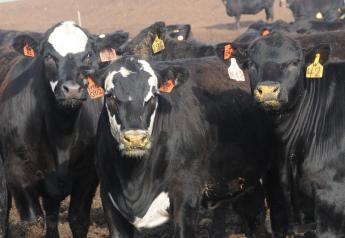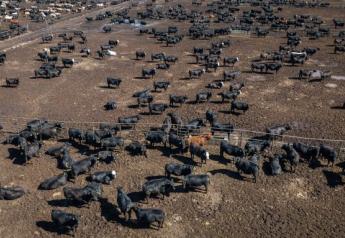Research Grant to Fund Test of Feeding Seaweed for Methane Reduction

The Foundation for Food and Agriculture Research (FFAR) this week awarded a $50,000 grant to Elm Innovations and the University of California, Davis to investigate the potential for mitigating methane emissions from dairy cattle by adding red seaweed to their diets. In the U.S., cattle are the largest contributors to methane emissions associated with human activity.
Cattle “burp” methane, a powerful greenhouse gas, as a normal by-product of digestion. The dairy and beef cattle industry currently lacks an impactful and economical solution for this problem.
“So far attempts to reduce methane emissions from cattle digestion has been met with limited success. However, some feed additives, including seaweed have the potential to reduce methane from enteric fermentation substantially”, according to Dr. Ermias Kebreab, Professor and Sesnon Endowed Chair, at University of California, Davis, and a collaborator on the project.
Prior research indicates that a seaweed species, Asparagopsis, can reduce methane emissions associated with cattle digestion by more than 80 percent. This research is the first U.S. study to evaluate the effects of a dairy cattle diet supplemented with red seaweed on methane emissions, milk production and quality, and feed intake. The ultimate goal is to determine the optimal amount of the seaweed additive for climate impact and animal well-being. Results of the research could also lead to commercial opportunities for red seaweed farming and new cattle feed products.
“This research presents an innovative solution to dramatically reduce greenhouse gas emissions from the dairy and beef cattle industry, and also increase animal health and productivity in a natural way,” said Sally Rockey, Ph.D., Executive Director of the Foundation for Food and Agriculture Research. “This research also will assist private sector organizations and states meet their sustainability goals.”
Results from this study have potential to support efforts to reduce greenhouse gas emissions, which are of increasing concern to responsible dairy and beef producers, states and the food industry. California state law, SB1383, mandates a 40% reduction in methane production, relative to 2013 levels, by 2030. Furthermore, many major food and restaurant chains, whose products are dependent on the cattle industry, have pledged to significantly reduce emissions. These corporations cannot meet their sustainability goals without exploring opportunities to reduce emissions from the cattle industry.
FFAR awarded this grant to Elm Innovations to support work at University of California, Davis. Principal Investigator Joan Salwen, Distinguished Careers Institute Fellow at Stanford University, will collaborate with Ermias Kebreab, Professor and Sesnon Endowed Chair, at University of California, Davis. The grant is being matched by the Schmidt Family Foundation. Other contributors include the David and Lucile Packard Foundation and the Skaaren Trust, for a total investment of $407,925.







